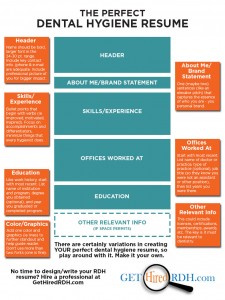I confess, I hate house cleaning! My wife, Tracie, actually kinda likes it – guess that’s partly why she likes practicing dental hygiene so much.
If I had to pick a favorite “I’ll-do-that” house cleaning task it would be emptying the trash. When I gather it up and take it outside it feels like a burden has been lifted – purging junk just purifies the soul, I suppose.
So this week, I want you to do the same with your resume and have listed here seven things to dump from your resume.
1. Dump the Wordiness Write your resume as tight (few words) as you can. Last week we talked about the value of lots of white space in your formatting. The more experience you have, the harder it is to find white space – tight writing can help with that. But you also want to use words sparingly so that your resume doesn’t look as intimidating to read.
Bad: “I started a new patient program that included an office tour and sit-down meeting with myself and the doctor. We improved patient retention by more than 25 percent.”
Good: “Implemented new patient orientation program, elevating retention by 25%.”
2. Discard the “I”s This ties into the last example. Did you notice we started the first sentence with “I” and the second one with “Implemented?” By eliminating the pronoun and going straight to the verb the sentence gets a jump start. Studies show it drive’s the reader’s attention directly to what you did – resume readers are conditioned to look for these active words. Start all your bullet-point descriptions with them. If you’re stumped, here’s a pretty good list of them
3. Trash the Typos! This should go without saying, but it’s shocking how many resumes contain obvious typos – and some employers will hold it against you. We all make them (yes, me too). So proof-read it as much as you can but, your best defense is have one or two others read it also. Consider hiring a professional, if your friends don’t feel confident either.
4. Throw Out the Objective Statement As I mentioned last week, most resumes begin with an objective that is some sort of ho-hum vague statement about your career objective. Get rid of it – everyone has the same objective! Instead, share your personal brand – who you are, what they will get when they hire you, what makes you unique or different. Keep it short (1-2 sentences) and succinct. Think of this as sort of like an “elevator pitch” – that brief statement you make when someone asks, “What do you do (for work)?”
5. Delete the Tasks Many hygienists focus too much of their resume on things that all hygienists do. For example, “Took x-rays,” “Provided scaling and root planning,” or Educated patients.” If that’s all you have right now you can survive with it, but there is much a better way.
Begin thinking about and collecting (over the course of your career) results, accomplishments, achievements, experiences, specialized training, and unique personality traits or mannerisms you have. These are all differentiators – things that are unique to you – and they are powerful to your job hunt, including the interview phase.
I steer my clients toward a functional style of resume (see our article from two weeks ago). In a functional style you have an opportunity to showcase what’s different about you right near the top in it’s own section. Keep track of your differentiators so you can really shine in this section by highlighting results, instead of just listing tasks.
6. Eliminate the Mailing Address Simply put, you don’t need to include a mailing address on your resume – that’s old school! There are two great alternative methods of communication (phone and e-mail) that are faster and more convenient for both you and potential employers.
The second reason is dental offices may use where you live against you – believing that if two equal candidates live 10 and five miles from the office, the latter will have the advantage. There’s a pretty decent chance your physical address won’t even come up during the interview stage, so just leave it off.
7. Remove the “Extras” Aside from your name, contact information, about me, skills/results, work history, and education, most hygienists really don’t need any other resume wording when applying for a general clinical dental hygiene job.
Some hygienists tend to want to add extra things like: references information; licensure/certifications, continuing education classes, awards/recognition, memberships, and component participation, published articles and volunteer service (related and unrelated).
Unless you really need to fill up some space on your resume, I would suggest leaving those things off. If you have lots of extras or have done other dental industry jobs in a non-clinical setting, then you should consider setting up a website and detailing it all out there. Especially if you are seeking something different than just an average clinical position.









